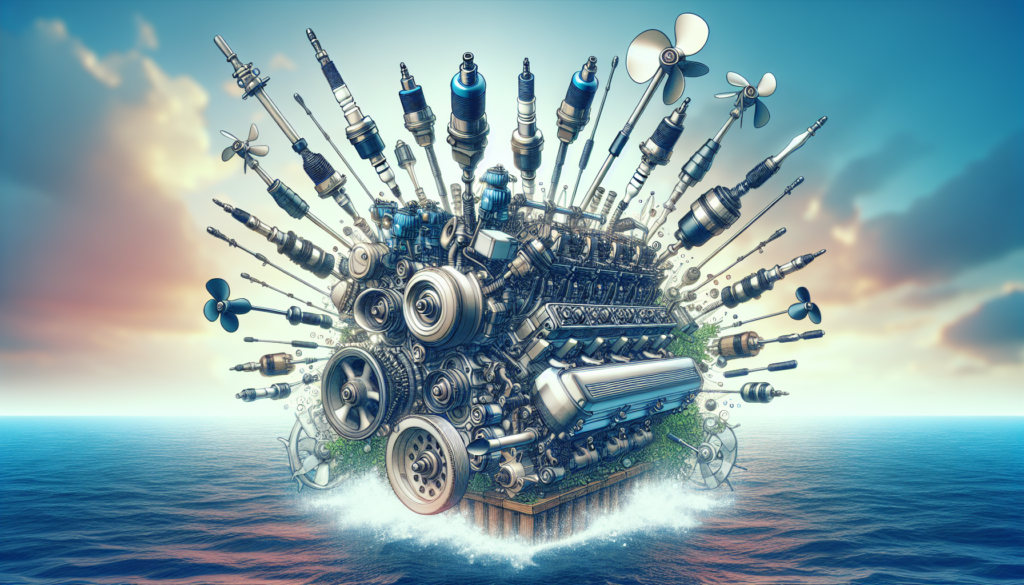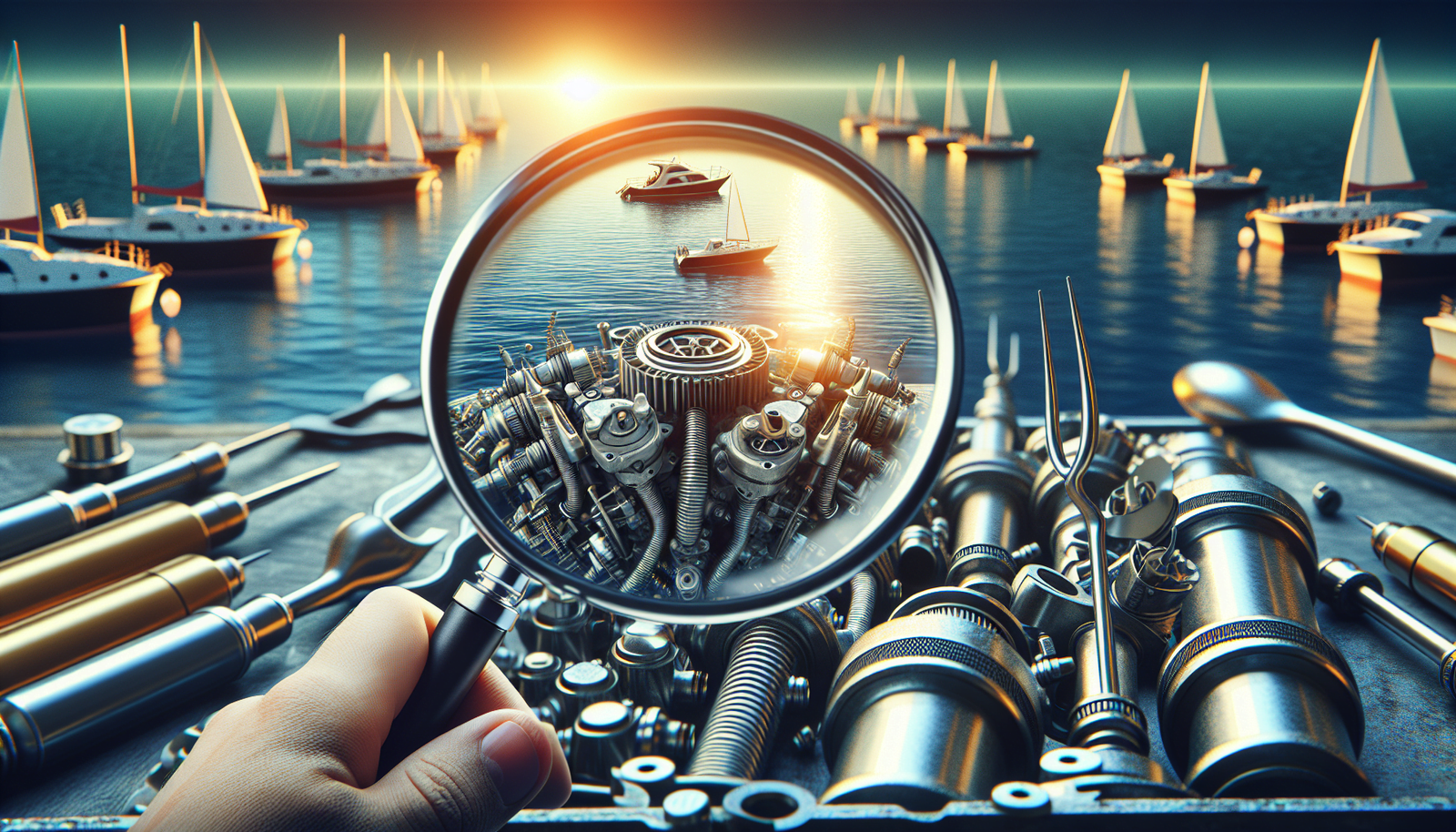You’re miles away from shore, engulfed by the serene tranquillity of the open water, when suddenly, your boat engine grinds to a halt. What do you do? “how to troubleshoot Common Boat Engine Problems At Sea” equips you with effective solutions to tackle such daunting predicaments yourself. This insightful guide takes you through a range of common engine issues, their potential causes, and most importantly, how to fix them. So, prepare to quell your panic, take the helm, and navigate your way out of such tricky situations like a seasoned sailor.

Understanding the Basics of Boat Engine
If you’re a boat owner or planning to become one, it’s essential to familiarize yourself with your boat engine. Just like a car or any other engine-operated machine, knowing the ins and outs of a boat engine is key to keeping it running smoothly, especially when you’re out at sea.
Getting to Know Your Boat Engine
Your boat engine is the heart of your vessel. Depending on the type of boat you own, you might have an outboard engine located outside the boat’s hull, or an inboard engine tucked away inside the hull. Take the time to thoroughly study your boat’s engine model. Understand its different parts and their functionalities. This will help you diagnose and solve minor issues that may arise.
Importance of Regular Maintenance
A boat engine, like any machine, requires regular maintenance to ensure optimal performance. Regular maintenance tasks include changing the oil, inspecting the propeller, cleaning the cooling system, and maintaining the fuel system. Keeping up with these tasks can prevent potential engine problems, prolong your engine’s lifespan and eventually save you costlier repairs.
Learning Basic Boat Engine Vocabulary
Learning the basic boat engine vocabulary will not only help you understand your boat better, but it also makes addressing issues easier. Terms such as propeller, carburetor, ignition system, coolants, thermostat, and many others are frequently used in boat engine troubleshooting procedures. Therefore, a basic understanding of these terms will make maintenance and troubleshooting less daunting.
Identifying Common Boat Engine Problems
The seas can be unpredictable and tackling common boat engine problems on your own is a skill that every boat owner should master. Recognizing and understanding these common issues can certainly save you a lot of trouble.
Sudden Loss of Power
There’s nothing worse than losing power in the middle of the sea. Sudden power loss, or your engine not reaching the desired RPM, could be due to various reasons including a clogged fuel line, an old spark plug or an electrical fault.
Difficulty in Starting the Engine
Having difficulty starting the engine is another common problem, which could be caused by problems with the battery, the starter motor or the ignition system. Understanding how these components work could save you a serious headache.
Excessive Engine Vibrations
Excessive engine vibrations could indicate issues with the propeller, the engine mounts or an imbalance in the drive shaft. Not only are such vibrations annoying, but they can also cause additional damage to your engine if left unchecked.
Overheating of the Engine
An overheating engine is a serious issue that may lead to engine failure. This problem can stem from issues with the water pump, the thermostat, or a leak in the coolant system.
Troubleshooting Sudden Loss of Power
Should your boat engine suddenly lose power, there are several steps you can take to troubleshoot and potentially resolve the issue.
Checking Fuel Supply
Firstly, check your fuel supply. Ensure that there’s enough fuel in the tank and the fuel supply line is not clogged or leaking. It’s also important to check the fuel for contamination, as water or dirt present in the fuel could hinder engine performance.
Inspecting the Air Filter
Secondly, inspect the air filter. A dirty, clogged air filter can restrict airflow to the engine and cause power loss. If the air filter is dirty, clean it, and if it’s damaged, replace it.
Possible Electrical Faults
Finally, inspect the spark plugs and wires for faults. These are essential for firing up your engine and faulty spark plugs or wires could lead to reduced power or even prevent your engine from starting altogether.

Dealing with Engine Start-Up Issues
When having difficulty starting the boat engine, different components need to be checked.
Evaluating the Battery Condition
Check the condition of your battery. Ensure it is charged and capable of holding a charge. Corroded terminals may also prevent electricity from flowing and thus need to be cleaned.
Testing the Starter Motor
The starter motor’s role is to turn the engine over. A faulty starter motor may prevent the engine from starting. Check the motor for any faults.
Checking Ignition System
Lastly, investigate your ignition system, which includes the switch, coil, and distributor. Any fault in these components could result in start-up issues.
Handling Excessive Engine Vibrations
Excessive vibrations can lead to further damage to other components of the engine. Therefore, when you notice such an issue, here’s where to look.
Assessing Propeller Damage
Check your propeller first. A bent or damaged propeller could cause vibrations. If you notice any damage, consider replacing the propeller.
Monitoring Engine Mounts
Check the engine mounts. These mounts secure the engine to the boat’s hull, reducing vibrations. Damaged or loose engine mounts could be the source of the excessive engine vibrations.
Identifying Imbalance in the Drive Shaft
Finally, check for any imbalance in the drive shaft. An unbalanced drive shaft could cause the engine to vibrate excessively.
Solving Overheating Issues
An overheating engine is not a sign to ignore. If you noticed your engine’s temperature rising above the norm, consider checking the following.
Inspecting the Water Pump
The water pump plays a crucial role in cooling down the engine. A faulty water pump could therefore lead to overheating. Check the impeller inside the pump for any signs of wear or damage.
Verifying the Thermostat
The thermostat controls the flow of coolant. When it malfunctions, the engine could overheat. Therefore, check if your thermostat is working correctly.
Checking for Coolant Leaks
Finally, check for leaks in the coolant system. Coolant leaks will lead to a drop in coolant levels, which in turn can lead to overheating.
Regular Maintenance to Prevent Issues
Prevention is always better than cure. Regular maintenance can help prevent many potential issues and thus, extend the life of your boat engine.
Setting a Regular Maintenance Schedule
Having a maintenance schedule helps in keeping up with necessary checks and replacements. It ensures that the engine is always in good condition and reduces the likelihood of unexpected malfunctions.
Performing Routine Engine Check
Always perform routine checks on your boat’s engine. This includes checking the oil and coolant levels, inspecting the hoses and belts for any signs of wear, and making sure the battery terminals are clean and secure.
Familiarize with Boat’s Manual
Your boat’s manual is your go-to resource for all the necessary information about your vessel. The manual gives you all the specifications of your boat and the details of how to maintain and troubleshoot the common issues.
Proper Storage of Boat Engine
How you store your boat engine when not in use significantly affects its longevity. Some practices ensure that the engine stays in the best shape even during long periods of non-use.
Importance of Proper Engine Storage
Proper storage of the boat engine prevents moisture accumulation, corrosion or any form of damage that could arise from prolonged disuse.
Procedures for Storing the Boat Engine Properly
When storing your boat engine, always ensure that it is clean and dry. Drain all fluids to prevent them from drying out and causing blockages. Disconnect the battery to prevent it from draining. If you have an outboard engine, store it upright to allow any water to drain out.
Potential Damages Due to Improper Storage
Improper storage can lead to corrosion, battery damage, and dried out seals and gaskets, which may culminate in expensive repair or replacement costs.
When to Seek Professional Assistance
While owning a boat comes with the responsibility of maintaining its engine, there are times when seeking the help of a professional is the best course of action.
Recognizing the Limitations of DIY Troubleshooting
It’s essential to realize your limitations when it comes to DIY troubleshooting. If you’re unsure about what you’re doing, or the issue seems complex or beyond your knowledge, you’re better off seeking professional help.
Factors to Consider When Hiring a Professional
When hiring a professional, consider their experience, expertise, qualifications, availability for emergencies and cost of service. Moreover, it might be beneficial to read reviews from their previous clients before making a decision.
Ensuring Regular Professional Checks
Regular professional checks are an excellent way to ensure your boat engine stays in top shape. A professional can spot potential issues that you might overlook and could provide preventive maintenance.
Safety Measures During Troubleshooting
Troubleshooting your boat engine involves detailing with many components, some of which might be hazardous if handled incorrectly. It’s important, therefore, to ensure your safety during this process.
Safety Gears Necessary for Troubleshooting
Wear safety glasses, gloves, and closed shoes when working on your boat engine. If you’re working in a poorly ventilated area, consider wearing a mask as well.
Understanding Risk Factors
Understanding the risk factors involved in boat engine troubleshooting is crucial. Be aware that you’re dealing with inflammable substances, and mishandling parts can lead to parts flying off or sharp edges causing injuries.
Emergency Measures During Breakdowns at Sea
If your boat engine breaks down at sea, firstly, don’t panic. Ensure you have a VHF marine radio to call for help. Always have basic tools and spare parts onboard. Lastly, remember that safety comes first, ensure you have life jackets for everyone on board and follow emergency procedures. It’s always advisable to get professional assistance in such situations.
In conclusion, owning a boat is a significant responsibility. Understanding the basics of boat engine, identifying common problems and knowing how to troubleshoot them, ensuring regular maintenance and proper storage, knowing when to seek professional help, and ensuring safety during troubleshooting are key to enjoying a trouble-free experience with your boat. Learning these might seem daunting initially, but over time these will come naturally and you would have mastered the art of maintaining a boat engine. So, all set to sail?

